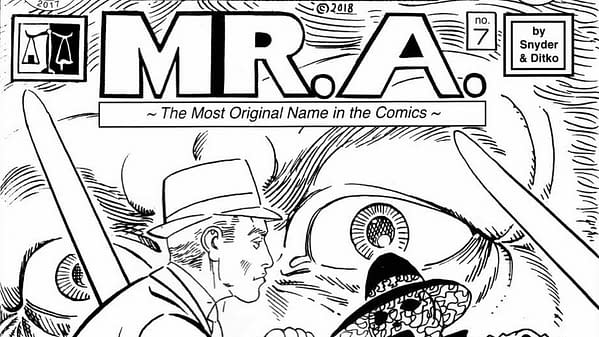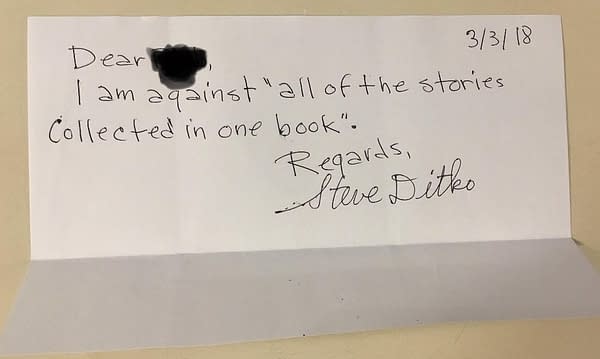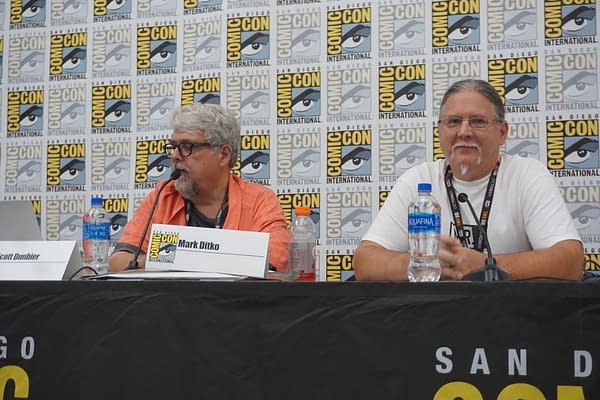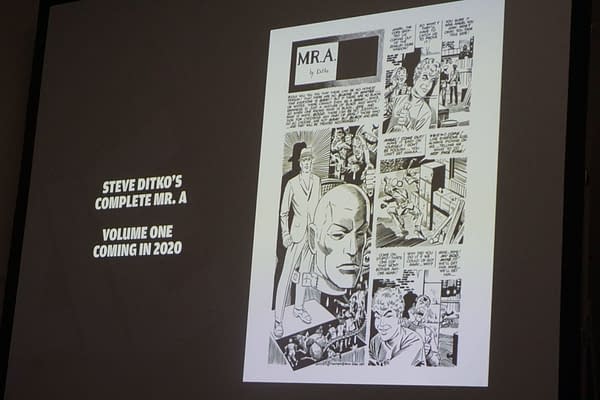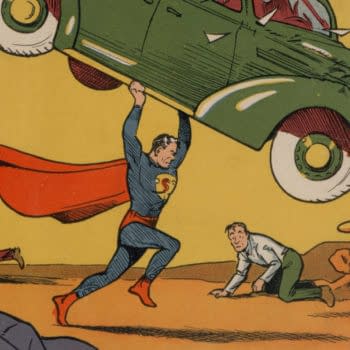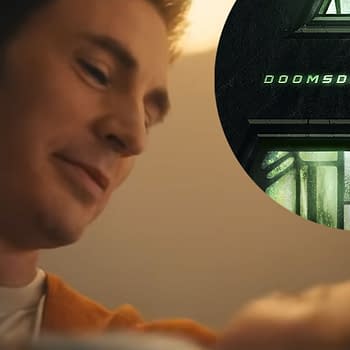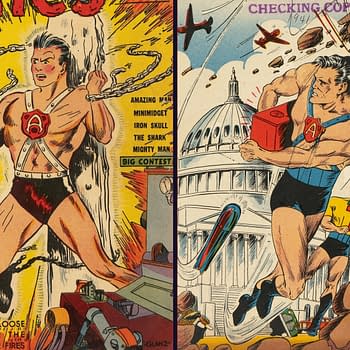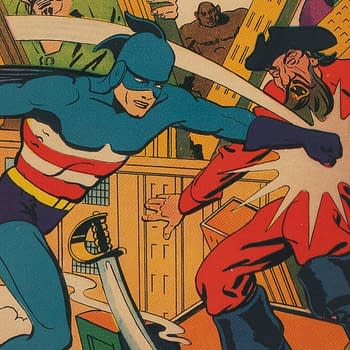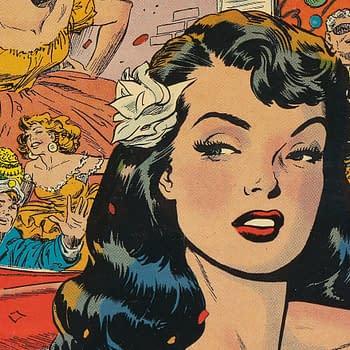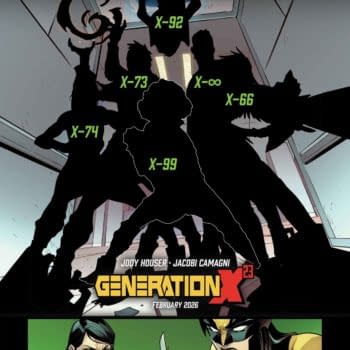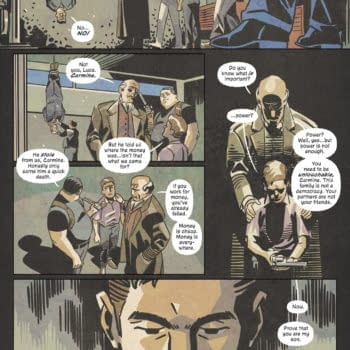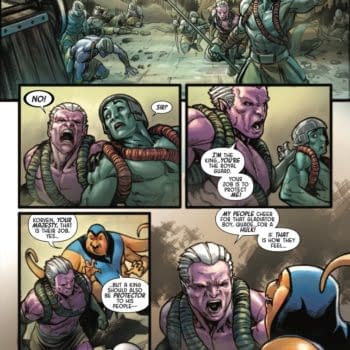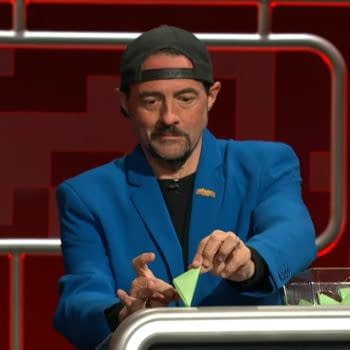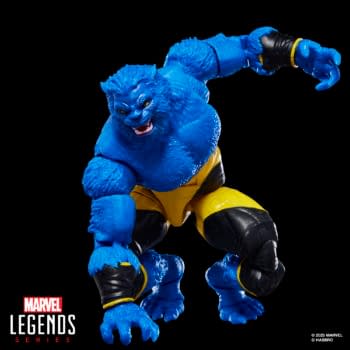Posted in: Comics, IDW | Tagged: mark ditko, scott dunbier, steve ditko
Steve Ditko's Mr. A. Will Be Collected Against His Wishes
As BC reporter Joshua Stone sat in on the IDW Artist's Editions & More panel Sunday afternoon at San Diego Comic-Con, I was curious to see what news he'd be reporting on regarding their upcoming offerings. I'm a fan of the Artist Edition format, and the the top shelf in the corner of my office sags slightly under the weight of a large number of them. Short of the original art itself, it's a pretty good way of getting inside of an artist's head during the time he created the pages in question. The full-size pages shown in all of their ink-stroked, pencilled-up, whited-out glory tells you an awful lot about an artist's intent, that you often can't tell from the comics themselves.
When Joshua noted that Mark Ditko — a nephew of comics legend Steve Ditko — was on hand at the panel, it caught my attention, and when he further noted that IDW would be collecting Ditko's Mr. A. into hardcover volumes beginning in 2020, I have to admit I was surprised. As BC showed you just last year, Ditko himself made it plain in a letter in response to a fan question that he was against having his Mr. A. stories collected.
As fans, what we know of Ditko the man is that he was a person of strong convictions that shine through in his work, so I asked Joshua to put the question to Mark Ditko: was this collection contrary to Steve Ditko's wishes? To his credit, Mark Ditko admitted that he was aware of his uncle's intent in this regard, but that his father (Steve Ditko's brother) wished to move forward with the collection. IDW's Scott Dunbier followed up with some commentary regarding the importance of preserving a major body of work by one of comics' most important creators.
It's not an easy matter to decide. There are several examples from history where similar instructions by important artists and writers were also willfully ignored — or obeyed. Franz Kafka burned several of his manuscripts during his lifetime and instructed his friend Max Brod to destroy the remainder upon his death. Brod disobeyed his friend's wishes, feeling that Kafka's work should be shared with the world. At the other end of the spectrum, Terry Pratchett left instructions that the remainder of his work at the time of his death, which was contained on a hard drive, should be crushed with a steam roller and irrevocably destroyed. These wishes were carried out in 2017.
The matter of Mr. A. is perhaps not precisely analogous to either of those situations — but practically speaking, it's close. With a fair bit of effort, one might be able to piece together a collection of all known, published Mr. A. material, but making it widely available will certainly require the kind of collections that IDW and the Ditko family are suggesting.
All this said, the question can be simplified from a fan's perspective: do I as a fan want this volume despite knowing full well that Ditko didn't want it to be made?
For literally any other creator in comics history, my answer would probably be a simple yes. Many creators, like Kafka, may feel that a portion of their work is flawed or inadequate and best left to the crumbling newsprint of history, but it's arguable that readers are the far better judge of such things. Creators who cringe to look at their earliest works are not uncommon, while many readers are eager to see that earlier work because they understand that it has context. It may show the artist's growth, and the circumstances of the art's creation at any given time. Where the artist or writer only sees the work's flaws, the reader is more likely to see a promising beginning, challenges that were overcome, and signs of the artist's creative process at work.
However, one can make a pretty good case that artistic intent mattered to Steve Ditko more than it has to just about any other creator… ever? I've always found the act of artistic will it must have taken to detach himself from an entire world of fans, readers, casual filmgoers, consumers, tv viewers, and news media who would have (and did, from afar) adored him for co-creating one of the most popular and successful characters ever in Spider-Man to be damn near beyond human comprehension. I understand the intent, I think. But to actually walk that walk for decades? It seems… superhuman.
In the transcript below, Mark Ditko says that he's long felt that the ways the world described this seeming isolation has been derogatory. I see the point, but frankly I've always been in complete awe of it. It's a deliberate act of artistic intent without parallel in recent human history.
Intent mattered to Steve Ditko, a lot. I've probably talked myself into buying the Mr. A. collections from IDW as I've been thinking through this post — taken as a whole, Mr. A. as a decades-long work that Ditko kept writing and drawing until the end likely speaks volumes about how he acquired that godmode artistic will that he seems to have had. But I feel like I owe it to him to at least think about why he didn't want these collections to exist.
It's a worthwhile conversation, in any case. The transcript of the IDW Artist's Editions & More panel with Scott Dunbier and Mark Ditko below courtesy of Joshua Stone contains the start of that conversation, and perhaps the start of a few more.
Scott Dunbier So I always felt, and I know a lot of people sort of did too, that Steve Ditko lived a solitary life. And didn't really have interaction with many people. But I'm really happy to say that's not true.
Mark Ditko The Ditko family intends to carry on his legacy and promote it. This is just a starting point for us, and we're still getting our heads wrapped around what this all means, and what we're going to do. We have bigger plans, things that I can't talk about at the moment that we've been talking about for a year now.
I've tried to insert myself into as many Ditko panels as I can, whenever I hear about them. One of the things that we want to do is bring something to the table that has never been brought to the table before. Sometimes panel members, they only saw a little slice of him. What we want to do is basically just let more people know who he really was.
When he passed away I went back to Johnstown [Pennsylvania] and there happened to be a Ditko panel here that I really really wanted to be on, with Steve Leialoha and Paul Levitz. But I was in Johnstown at the time. My dad [Steve Ditko's brother Patrick] said 'you know what we really need to do is a book or documentary of some sort of.'
He said that we need to do a book "Steve Ditko: the Man". Who he was as a brother, as an uncle, as a son.
That is something that my dad really wants to do and we will push that forward, we're kind of actively working on that now. We have a lot of projects going on. This is really just kind of an entrance point, it's actually something that my dad wanted to do, sort of right out of the gate.
He was… you know, they use this word all the time, a recluse, you know, he was whatever words, you know… To me they're all derogatory.
It's not how I knew him. It's not how a saw him. He was my uncle. He was a family member. When I grew up, he was always there. I mean, I don't know how he was, he was in New York working. But he was always there. He was always just goofing around with us. He was one of our fun uncles.
We were all artists when we were growing up. We were always drawn inking, everything, you name it, black and white, color, we were always doing stuff. I was a colorist and had I known what Mike [Mark's brother?] was doing I would've said "you've got to get me into the coloring side", because that was really my passion. But my older brother would take his art to him, and he would give critiques and recommendations. That's the person that we knew. Early on in the 60s, we had no idea what he really did. We just knew he was a really good artist, but we really didn't know that his comics were all around the house. Four, five or six year old kids… Who's looking at the artist at that point, we're just reading comics.
You know, I'm enjoying Konga, and whenever he would come around I asked him to draw me a gorilla. I never even put them together. It's like, wow it looks just like the comics that I read. We never put it together, you know.
Mr. A. was kind of where his heart was philosophically.
He believed a lot of things that maybe in some people's minds were too staunch or too hard line. I don't know. I look at all that stuff through my eyes. What is so wrong with having in some instances a black and white philosophy of right and wrong.
When you're teaching your kids, do you teach your kids about gray areas? It's okay to steal a pencil and paper but not something over 50 dollars. Some things are black and white.
That was the frame of what he's doing and that's something that I want to do. He and I wrote profusely back and forth.
I'm trying to bring to the table more of who he was. And my dad as the actual historian of the family will bring his aspect to it.
Questioner You just mentioned that you wrote back and forth a ton over his philosophy. Are those letters going to be reproduced in the book? Because I think that would be so wild to read.
Mark Ditko We used to write him back… 40 page letters.
Craig Yo put up a page on Facebook, 'Steve Ditko letters' or something. And people were posting their letters that they had received from him. It gives you, in some cases, a picture of who he was.
Some of them are very cold. I think with my uncle… and I've experienced it with him, is it depends on how you approach him, and he would reflect that to a certain degree. If you were very like, in his face, "Tell me about Spider-Man". He might give you what might seem a harsh letter back.
When we went to the studio, to clean out his effects and things we couldn't open the door initially because of the fan mail that was blocking the door that had… for probably about two months or a month and a half he hadn't been there. He was in his apartment not in the studio. He was in and out of the hospital a bit.
So in his studio when we went there, there's a mail slot. And it was full to the mail slot packed full of things. There were hundreds of letters just in that couple months time span and I eventually want to get around writing everyone back.
Some of those letters I opened and read them and they were from the director of Doctor Strange, to little kids, you know five year old kids or something. But there was things that he had regular correspondence with, and people who were brand new.
So he was profuse communicator. But his media was letters, he loved the letters.
Has anybody in here ever written to him or gotten letters back? You know, that's what would have happened, if you wrote him he would've wrote you back. That's that's the way he rolled.
So anyway in answer the question you know when I was reading that letters page I was like wow this is really you know enlightening. But sometimes you don't get what was written to him, and then you kind of get this dialogue. Well, I have all that dialogue.
A lot of it's family stuff. It's not a whole lot of his involvement with Marvel or DC. It's sort of the human side of him and the philosophical side. I mean, to me he was he was my 21st century guru of sorts. So that potential is not off the table.
Questioner I noticed you use the word "We" when referring to your family. Is there going to be more collaboration from the family?
Mark Ditko Absolutely. In fact when I say 'we' there's 13 of us. My dad, his surviving sister, and then all of the nieces and nephews. Now, I'm the one that's closest to him in terms of his philosophy and dialogue and he sent me a lot of material. And then in his later years he sent my dad stuff like his military photos and discharge papers and a lot of other personal things. So I've sort of been the spokesman.
Questioner I know that Steve had done a lot of Kickstarters. That's how a lot of his publishing had happened over the last number of years. Did he still possess all that art?
Mark Ditko I can't answer that.
One thing that we will be doing is we will be publishing things in different volumes like this. Once we understand what we're doing, who we're doing it with, how we're moving forward.
This is just kind of a lot of work, but we don't have a master plan yet. But I think just conceptually a lot of the stuff that he did we will be looking at republishing in a higher grade format.
I've read several of his essays that have been published by Robyn Snyder. The essays give the impression that a large portion of his concern near the end of his life was comic book fandom. And especially interpretations of what happened in his career, interpretations of the stories. And just saying that they're not based on evidence, they're based on speculation. Do the essays distort the importance of that? Was that something important, was that a large part of his life?
Good question. That is something that we're still really looking into. But what he wrote, he wrote. I mean, he meant every word he wrote.
You can only take it at face value. All that I'm going to try to do is to hold true to what he wanted what his original intent [was], He and I wrote back and forth about things he wanted to do in the future. That's one of my main focuses. I want to do what he intended or wanted to do and just hadn't accomplished yet.
Questioner You mentioned that you're doing what Steve wanted to do. Did he change his mind? Because I know there is a letter out there where he said that he didn't want all his art and stories collected.
Mark Ditko Yes, he did say that.
What can I say.
You know what, some of this is being driven by my dad, my dad has said "I want to do this". And my dad was his brother. I think I will always have to wrestle with some things like that. Right or wrong.
Dunbier To preserve the legacy of one of the most important comic creators ever. The man who co-created Spider-Man and according to Stan Lee, entirely created Doctor Strange. Not to mention a vast body of incredible work on other things. His Charlton work. And really his life's work. Mr. A., which started in Witzend #1 in 1967. 50 years… that's pretty damn impressive.
I think the fact that the family is going to be involved in this sort of speaks volumes.I would hope that Steve Ditko would be ok with it.
Mark Ditko Well, you know what… when we wrote back and forth there was one letter. I can't remember the exact words. We were talking about his characters. He said something to the effect that he loved Mr. A. when he created him, he loves doing him in the present and he wants to see him in the future.
So. I know he said he never wanted a compilation. I know that. So I kind of have to wrestle with some of this stuff. You wanted to see him in the future and continue into the future. How do I resolved that?


